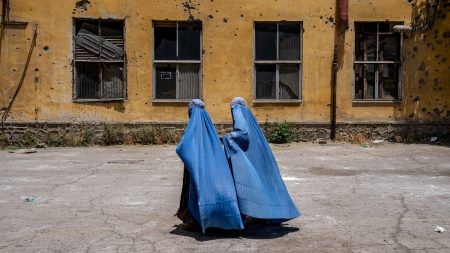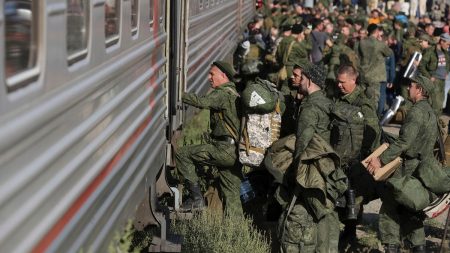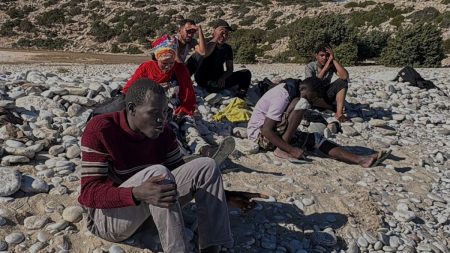The 2024 U.S. presidential election saw a significant shift in Arab American voter support, heavily affecting Vice President Kamala Harris’s campaign. In a startling turn of events, Donald Trump, upon his return to the presidency, garnered remarkable support in Michigan’s Dearborn—a city with one of the highest concentrations of Arab Americans. Days before the election, Trump visited a Lebanese café in Dearborn, where he confidently proclaimed the prospect of peace in the Middle East while signing a “peace plaque.” His visit reportedly resonated with local voters, contributing to his 42% share of the vote in that area, while Harris struggled to secure only 36%. This decline marks a stark contrast to Biden’s near 70% support among Arab Americans in 2020, illustrating a dramatic loss of trust from this demographic.
This recent support for Trump among Arab Americans stands in stark contrast to his first term, which was characterized by numerous actions that alienated Muslim communities in the United States. His 2016 campaign rhetoric, which proposed a “complete and total shutdown” of Muslim immigration, alongside a travel ban from several Muslim-majority countries implemented shortly after his inauguration, fostered significant backlash. Moreover, his administration’s decisions to shift the U.S. embassy to Jerusalem and recognize Israeli sovereignty over the Golan Heights further strained relations with Arab and Muslim communities. The stark change in voter sentiment highlights a complex evolution in the Arab American perception of Trump, suggesting that they may be reconsidering past grievances in light of their immediate political and social concerns.
At the heart of the Arab American engagement with Trump during this election was a crucial visit to the café by Trump, which facilitated communication between him and local Arab American leaders. Figures like Faye Nemer, Director of the MENA-American Chamber of Commerce, expressed a belief in Trump’s sincerity, implying a potential new rapport between the Trump campaign and Arab Americans. Nemer’s own background of having experienced the turmoil of the Lebanese Civil War informs her perspective, leading her to view Trump as someone capable of understanding the need for peace and stability in a historically volatile region. The burgeoning relationship was further evidenced by endorsements from local community leaders during Trump’s campaign visits, which signaled a shift in political allegiance.
Despite early optimism among Arab Americans regarding Trump’s return to the White House, signs of potential disillusionment are already emerging. Following his election, Trump began announcing controversial appointments that could significantly shape his Middle East policies. Notably, figures like Elise Stefanik, poised to become his UN ambassador, have vocalized strong anti-UN sentiments concerning Palestinian support. Additionally, Trump’s proposed Israel ambassador, Mike Huckabee, has consistently downplayed the Palestinian identity, raising alarm among pro-Palestinian advocates who fear an exacerbation of the already fraught situation in the Middle East. The disconnection between the initial goodwill towards Trump and the implications of his appointments fuels skepticism regarding whether Arab Americans can truly expect a change in policy.
The shift in Arab American support also reflects a broader disenchantment with the Democratic Party. Many within the community expressed frustration with what they perceive as a failure to recognize their issues adequately, leading to over a 50% loss of support for Harris compared to previous elections. Campaign interactions with Harris’s team left community leaders feeling like “lesser humans” when it was indicated there would be no changes to Middle East policy. This feeling of neglect and sidelining is echoed in the frustrations expressed by community members who felt both political parties have failed to represent their interests and concerns adequately.
In conclusion, the ongoing dynamics in Arab American political alignment post-election illustrate a complex relationship with both major political parties. While there appears to be a significant shift toward Trump among some Arab American voters, exhibiting their search for agency in political representation amidst longstanding grievances, there is also an undercurrent of skepticism about his genuine intentions and the risks associated with his administration’s policies. The experiences shared by community members reflect deep disillusionment with the political status quo, highlighting a need for genuine engagement and consideration of their unique perspectives if either party hopes to reclaim their support in future elections. Ultimately, the trauma and historical complexities surrounding the Middle East conflict continue to shape the political landscape in America, leaving many in the Arab American community navigating their identities and political affiliations in challenging waters.














